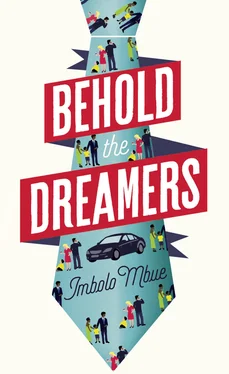Jende began to feel lighter, a leaf released from beneath a rock. His situation wasn’t half as bad as he’d feared. How much would it cost to fight all the way to the end, he asked Bubakar. A few thousand, the lawyer told him. But no need to worry about that just yet. “You and your cousin have already spent a good amount of money to get you this far. Take a break and save for the battle ahead. When the court sends the Notice to Appear, we’ll discuss a payment plan.
“You are in a better situation than many others,” Bubakar added. “You have a wife who has a job, even though she does not have working papers. Immigration didn’t get back to us within a hundred and fifty days after we filed your application so I forced them to give you a work permit. At least you have been able to work legally. At least there are two of you, my brother. You can both work and pay whatever bills you have. Some families don’t even have one job.”
“But what about my work permit?” Jende asked. “Will I be able to renew it after it expires now that Immigration wants to deport me?”
“Did your employer ask to see your work permit when he hired you?” Bubakar said.
“No.”
“Good. Then stay with him.”
“But what will happen if I cannot renew it and the police stops me and—”
“Don’t worry about things that might never happen, my brother.”
“So if my work permit expires and I cannot renew it and the police stops me on the road, I won’t get into trouble for working as a driver?”
“Listen to me,” Bubakar said, somewhat impatiently. “As far as Immigration is concerned, there are many things that are illegal and many that are gray, and by ‘gray’ I mean the things that are illegal but which the government doesn’t want to spend time worrying about. You understand me, abi ? My advice to someone like you is to always stay close to the gray area and keep yourself and your family safe. Stay away from any place where you can run into police — that’s the advice I give to you and to all young black men in this country. The police is for the protection of white people, my brother. Maybe black women and black children sometimes, but not black men. Never black men. Black men and police are palm oil and water. You understand me, eh?”
Jende said he did.
“Live your life wisely and put aside all the money you can,” Bubakar said. “Maybe one day, Inshallah, an immigration bill like the one Kennedy and McCain were fighting for will pass Congress and the government will give everyone papers. Then your wahala will be over.”
“But Mr. Bubakar, after that thing did not pass, I just lose all hope.”
“No, don’t lose all hope. Maybe one day, Obama, Hillary, if one of them wins president, they’ll give everyone papers. Who knows? Hillary likes immigrant people. And Obama, he must know some Kenyan people without papers that he’ll like to help.”
“But can such a thing ever really happen?”
“Oh, yes. It happened before, one time, I think 1983. It can surely happen again, but we cannot hope for it. We’ll keep on trying our own way, and you keep on sleeping with one eye open, eh? Because until the day you become American citizen, Immigration will always be right on your ass, every single day, following you everywhere, and you’ll need money to fight them if they decide they hate the way your fart smells. But Inshallah, one day you’ll become a citizen, and when that happens, no one can ever touch you. You and your family will finally be able to relax. You’ll at last be able to sleep well, and you’ll begin to really enjoy your life in this country. That will be good, eh, my brother?”
SHE MET HIM AT A CAFÉ ACROSS FROM THE PUBLIC LIBRARY ON FORTY-second Street, the same place where she had met him the past two times. After she’d emailed him the morning after he suggested they meet to talk about improving her precalculus grade, he had replied within an hour and proposed they meet in the café because he didn’t have an office since he wasn’t really a professor, just a mathematics Ph.D. student at the Graduate Center who was teaching for extra income and experience. He went to the café every Sunday to study, he told her during their first meeting, and he was glad to meet students there, though he didn’t understand why more students didn’t take his offer to help them. I am very grateful for your offer, Professor, she’d said to him, leading him to remind her once more that she didn’t have to keep on calling him Professor. Call me Jerry, just like everyone in class does, he’d said, but she couldn’t because he was her teacher and she had to address him properly, as she’d been taught to do in primary school.
“This is my son, Liomi, Professor,” she said upon arrival for the third meeting, pulling a seat from the adjacent table for Liomi. “I am sorry I have to bring him, but my husband is working, and we have plans after this with my friend.”
“No, not at all. Hi, Lomein, how are you?”
Liomi smiled.
“Open your mouth and talk to the professor,” Neni said.
“I am fine,” Liomi said.
“How old are you?” she heard the instructor say as she walked toward the counter to order two cups of hot chocolate. She heard Liomi say six going on seven, then giggle at something the instructor said. By the time she got to the front of the line Liomi and her instructor were chatting like old friends, the instructor drawing something on a notepad and making hand maneuvers which thoroughly amused Liomi.
“You have children, Professor?” she asked as she set the cups of hot chocolate on the table.
The instructor shook his head and, with a feeble smile, said, “I wish.”
“You can borrow mine if you want.”
“Oh, I’ll take him,” he said. “Just don’t be surprised if I refuse to give him back.”
“We can make arrangements for that,” she said, smiling as she pulled out her precalculus textbook. She was glad she was feeling more at ease with the instructor, to the extent that she was making jokes. On their first meeting, she’d been immensely uncomfortable spending one-on-one time in a café with a man she barely knew: The whole hour she had mostly nodded while the instructor spoke, scarcely asking questions, because she was afraid of asking a stupid question and embarrassing herself. Before the second meeting, though, she told herself it was no use going downtown if she couldn’t take full advantage of the instructor’s offer and ultimately improve her grade. So, though nervous, she had pushed herself to ask multiple questions, and the instructor had answered even the most stupid of them. By the third meeting — despite still being anxious enough that she’d told Liomi before they entered the café not to say a word to the professor lest he get upset by a child disturbing him and leave — she was feeling far more comfortable, so much that, toward the end of their session, she and the instructor began chatting about where they’d each grown up. The instructor’s father was in the military, she learned, and he’d lived in many parts of America and Europe. Germany was his favorite place to live, he said, because, even as a child, he could tell how much the Germans loved Americans, and it felt great to be loved for his nationality. She wanted to know more about what such a life was like, how wonderful or awful it must have been not to have the same friends for all of his childhood, but she didn’t know which questions were appropriate to ask of an instructor and which ones weren’t, so she told him about her life in Cameroon instead, about how she’d never traveled farther than forty miles from Limbe, laughing at how pathetic it now sounded. He was curious about her pharmacist dreams, but Fatou arrived early, with her two youngest children in tow, to put an end to their conversation.
Читать дальше







![Джон Макдональд - Wine of the Dreamers [= Planet of the Dreamers]](/books/430039/dzhon-makdonald-wine-of-the-dreamers-planet-of-thumb.webp)




